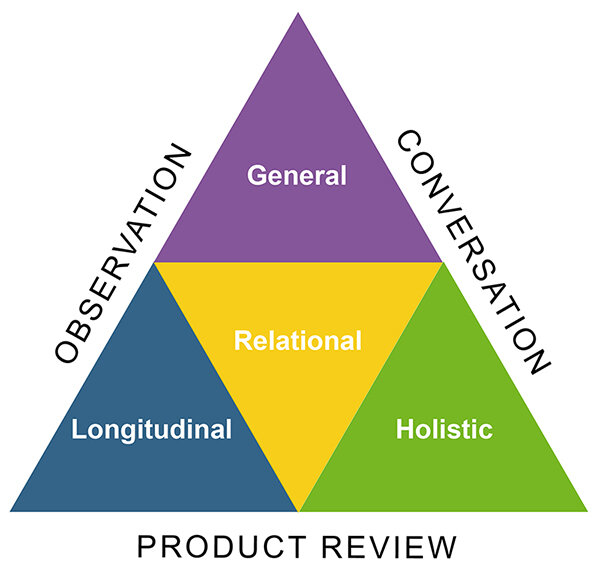August 21, 2023
by Greg Henson, CEO Kairos University; President of Sioux Falls Seminary
Thanks for joining us as we look at trustworthy assessment in competency-based theological education. Last week, we discussed the topic of assessment as learning. Today, we begin describing the framework we use for assessment at Kairos University. The image below provides a visual for how we envision trustworthy assessment. As you can see, there are three practices, each of which exhibits four characteristics. Let’s begin by addressing the three practices of trustworthy assessment.

We learned last week that the Ministry of Education of Ontario developed a resource in 2010 entitled Growing Success that provides helpful descriptions of the nature of assessment. The practices we identify in our framework are derived from their descriptions of assessment strategies like observation, conversation, and product. Our adaptations of them are most evident in the characteristics we outline and in the fact that we describe them as practices.
We focus on three practices because they form mentor teams, students, and one’s experience of one’s journey through Kairos. They are Observation, Conversation, and Product Review.
Observation
As the authors of Growing Success write, observation involves, “Watching, listening, and being attuned to students’ behaviour, emotional state, interests and abilities, patterns of development, and progress in learning.” We describe this as a practice because it is a particular way of interacting with those God places in our care. Through attentive observation, we are better able to walk with students on their journey of Spirit-led excellence and better positioned to ask good questions. In addition, the educational philosophy of CBTE is rooted in the fact that proficiency is something that can be observed. Through our observations, we are assessing the behaviors, attitudes, skills, dispositions, and cognitive abilities of students.
Conversation
One way to dig deeper into those behaviors, attitudes, skills, dispositions, and cognitive abilities is through the practice of conversation. Through conversations, we can experience how students articulate what they are thinking and ask questions to foster deeper levels of engagement. While conversations with a mentor or a team of mentors are useful in assessment, it can equally be helpful to engineer conversations in which the student is talking with peers or small groups of people. In those situations, we might be observing the student as she is participating in the conversation. If that conversation is connected to a project or assignment (e.g., a Bible study she developed and is now leading), we may be engaging in the third practice as well.
Product Review
In this practice, we are reviewing something the student has produced. It could be a paper, song, website, video, sermon, strategic plan, budget, reflection journal, blog post, software, Bible study, dance, coaching plan – the possibilities are almost endless. In this practice, we are providing feedback on whatever was produced by the student.
As noted above, it is possible to engage in all three practices simultaneously. For example, a student may develop a strategic plan (a product) and you, as the vocational mentor, observed the process by which she developed that plan because it happened in the midst of her day-to-day work (observations). Then, you facilitated a conversation with the student and the rest of the mentor team to hear how the student articulated and reflected on the process as a whole (conversation).
I find it helpful to name and be aware of these practices of assessment because they help us take a broader view of assessment as learning. They also give us ample opportunities to be a sojourner with the student as she walks through her time in Kairos. Next week, we will take a look at the various characteristics of assessment which provide windows into how the practices can be lived out in the context of an educational journey.